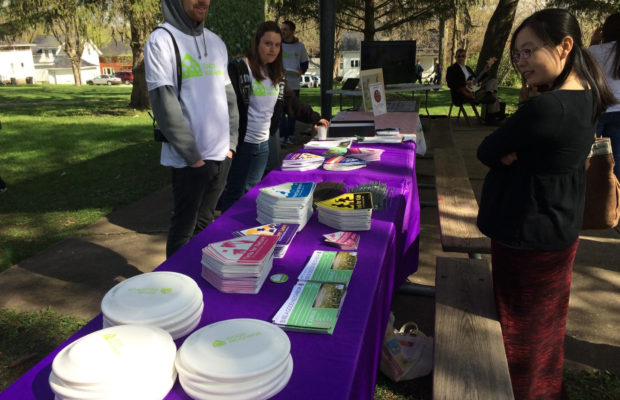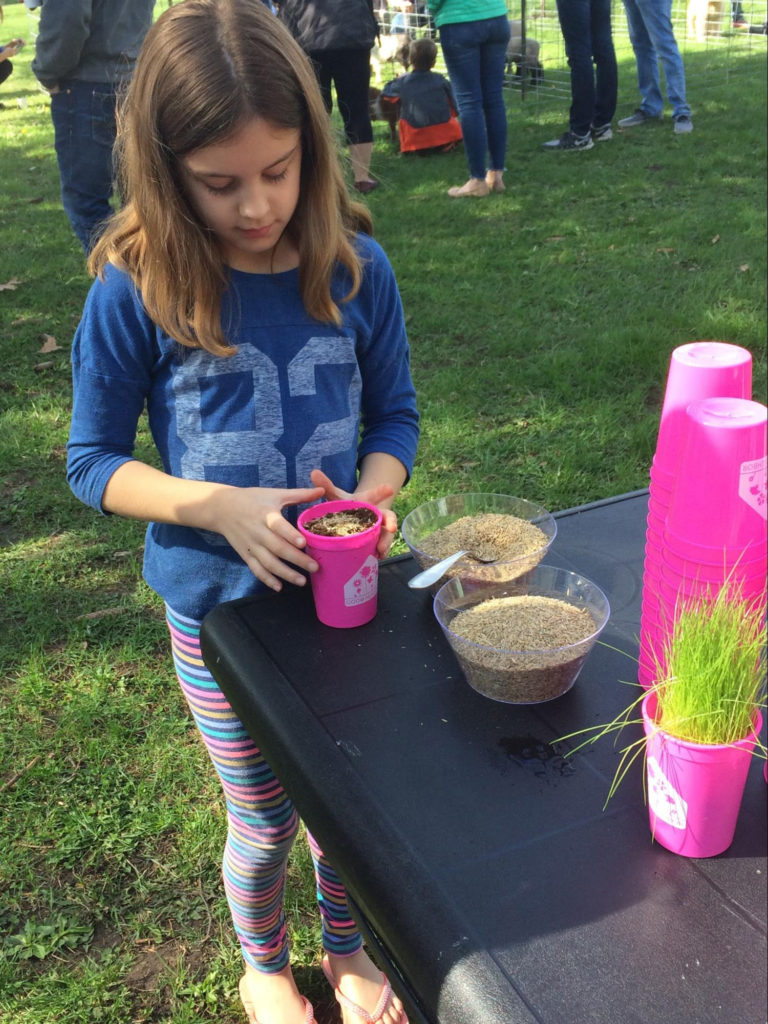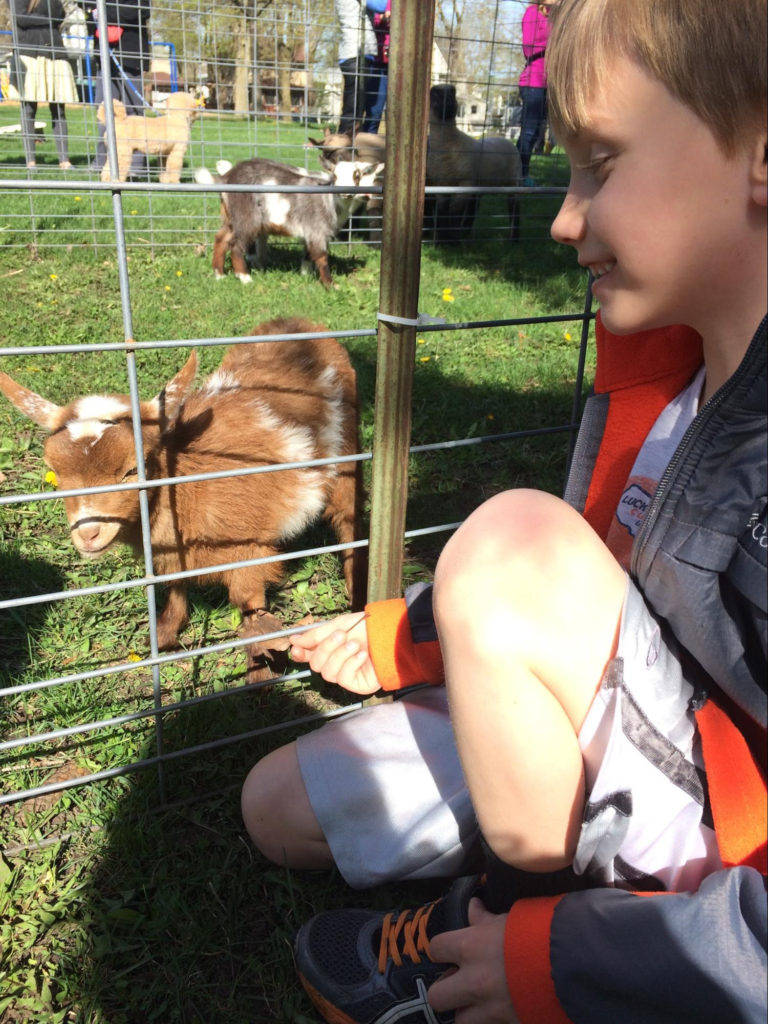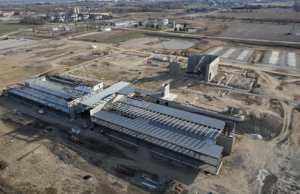Good Neighbor Iowa looking to expand pesticide-free properties in Cedar Valley

In 1987, the Journal of the National Cancer Institute did a study on households that use pesticides and found astonishing results. The study showed that household and garden pesticide use can increase the risk of childhood leukemia seven times as much as a household that doesn’t use pesticides, yet 2,860 pounds of active ingredients of pesticides, mostly 2,4-D, MCPP and Dicamba, are applied on school grounds, parks and residential areas in Cedar Falls.
On Friday, April 20, Good Neighbor Iowa, a statewide campaign, held an event at Seerley Park, a pesticide free area. The goal of Good Neighbor Iowa is to reduce children’s exposure to pesticides and protect water quality. The goal on April 20 was to change people’s attitude of what lawns should look like and for people to join the organizers in pledging to a pesticide free lawn.
For kids (and also adults) to enjoy, there was goats and sheep at the event, eating pesticide-free grass and leaves all morning. Other activities included Frisbees, coloring pages and a cup with dirt and seeds to grow one’s own pesticide-free grass. On another picnic table there were “Good Neighbor” yard signs spread out with phrases saying “Panther Lawn” or “Lawn For Kids” that one received after they pledged, in hope that all of the lawns in the city will be filled with “Good Neighbor” yard signs.
As a lot of people started showing up, the local leaders started to speak including Cedar Falls park director Mark Ripplinger, Cedar Falls family physician Kyle Christianson, Dubuque city staff Cori Burbach and Childcare Center director Linda Jacoby. These leaders shared their insights on pesticide use and the harmful effects of pesticides on children.
A big reason Good Neighbor Iowa is trying to eliminate pesticide use is the harmful effects it has on our bodies, specifically for children.
Christianson said pesticide exposure is higher for children, especially when they are getting it from their homes, parks and schools. “With that exposure comes an increased risk of cancer. Those cancers include leukemia and lymphoma. Some other side effects include behavioral disorders, ADHD learning disorder, prenatal disorders prior to delivery as the mom’s exposure increases risk to fetal-death, pre delivery and low birth weight,” Christianson said.
According to him, citizens are responsible for these risks, so everyone can do something about it; it’s just whether they want to. “All of us that have kids know that kids love to put their hands in their mouth, and they also explore the world with their hands. As developing beings, their organs are still maturing and developing which makes them at higher risk.”
A lot of movement is happening with the Good Neighbor Iowa campaign. For example, the City of Cedar Falls has pledged 24 parks to be pesticide-free, which is 503 acres. However, the campaign says the CF community now has to start taking over the campaign because they have the power to get schools, child care centers and other institutions pesticide free. “The future depends on us. We will have to have a bunch of us approaching schools, approaching child care centers, religious organizations, businesses and parks all over Iowa. It depends on people in this community becoming active. Students in your school could ask the school officials and say ‘Hey, we don’t want our school sprayed.’ Parents are going to be the biggest force for schools, because if I don’t have a child in the school, I don’t have any standing, it’s like ‘Who are you?’ But parents whose kids are in school have a lot of power, they should say, ‘Hey, wait a minute, right?’ How successful this is going to be is how much we engage in these things,” said Kamyar Enshayan from the University of Northern Iowa Center for Energy & Environmental Education.
The North Cedar Child Care Center has been involved in looking for nature exploration for young children for many years. The director and staff believe that the kids should have the right to explore the world in a safe and clean environment. “We believe it’s important to foster the love of outdoor time with children and their families, so we have not been using pesticides. We are very involved in having a natural setting that kids can explore in many ways. We are very excited for them to have that opportunity, and we also mentor other centers. It’s important to think in terms of all the different ways we are encouraging our children to be outdoors and involved, but what are we doing to protect them and keep this a safe environment?” Jacoby asked.
Before the campaign came to Cedar Falls, it was already working its way around other cities in Iowa, including Dubuque. “In Dubuque we have been doing a lot of things. Last year we kicked off an integrative pest management program. The highlight of that is in our 10 pesticide free parks, we don’t spray our lawns, we don’t spread any of our playground places, but we do do a little bit of line trimming in some of our spaces. Our goal is to continue until all of our parks become pesticide free,” Burbach said.
The event and website was created and set up by leaders Bettina Fabos and Enshayan’s UNI students. The website includes a three minute video on how America got to where it is with pesticides today. It shares research on how pesticides cause harm and how one can have a healthy lawn without pesticides.
There is also a map showing places that have pledged pesticide free and areas that are likely and not likely to spray pesticides. To view this website and learn more about the campaign and pesticides and pledge, visit https://goodneighboriowa.org/











You must be logged in to post a comment Login